|
|
|
Sort Order |
|
|
|
Items / Page
|
|
|
|
|
|
|
| Srl | Item |
| 1 |
ID:
167699
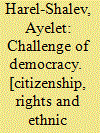

|
|
|
|
|
| Edition |
2nd Ed.
|
| Publication |
New Delhi, Cambridge University Press India Pvt Ltd, 2010.
|
| Description |
xv, 499p.hbk
|
| Standard Number |
9789382264576
|
|
|
|
|
|
|
|
|
|
|
|
Copies: C:1/I:0,R:0,Q:0
Circulation
| Accession# | Call# | Current Location | Status | Policy | Location |
| 059706 | 320.5405694/HAR 059706 | Main | On Shelf | General | |
|
|
|
|
| 2 |
ID:
145468
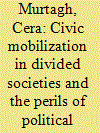

|
|
|
|
|
| Summary/Abstract |
This article explores how civic mobilizations that emerge in deeply divided societies navigate their ethnopolitical frameworks and assesses their capacity to effect civic political change within such contexts. The article examines these questions through the case of a citizens’ protest and direct democracy movement that emerged in the postwar state of Bosnia and Herzegovina in 2014. It concludes that the movement adapted to its ethnicized political environment by adopting an approach of limited political engagement and that, rather than trying to effect short-term political change, it chose to pursue a long-term shift in civic consciousness.
|
|
|
|
|
|
|
|
|
|
|
|
|
|
|
|
| 3 |
ID:
193036
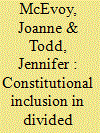

|
|
|
|
|
| Summary/Abstract |
Processes of constitutional discussion increasingly invite widespread popular inclusion and participation. Conceptual and practical problems remain, not least the respects in which inclusion is to take place. In deeply divided places, these challenges are intensified, first in the difficulties of conceptualising inclusion, and second in the practical dangers participation may pose to peace. We tackle these problems empirically by looking at a hard case of constitutional discussion amid division: the re-emergence of debate about Irish unity in Northern Ireland and the Republic of Ireland. Through focus groups and interviews, we explore how ‘others’, disengaged from the main political groups and defined transversally, approach the discussion, showing that they welcome the prospect of participation and seek to remove discursive triggers of conflict by focussing on shared everyday experience. We discuss the implications for the constitutional process and the likely impact on polarisation. The analysis has implications for the literature on divided societies, for constitutional theory and for policy. We argue that it is both possible and desirable to remedy group exclusion while facilitating universalistic discussion and lessening the dangers of polarisation. The policy implications are quite radical.
|
|
|
|
|
|
|
|
|
|
|
|
|
|
|
|
| 4 |
ID:
095086
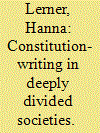

|
|
|
|
|
| Publication |
2010.
|
| Summary/Abstract |
The article addresses the puzzle of how societies still grappling over the common values and shared vision of their state draft a democratic constitution. It argues that an incrementalist approach to constitution-making enabled such deeply divided societies to enact either a written constitution or function with a material constitution by deferring controversial choices regarding the foundational aspects of the polity to future political institutions. It demonstrates how various types of incrementalist constitutional strategies - such as avoidance of clear decisions, the use of ambivalent and vague legal language, or the inclusion of contrasting provisions in the constitution - were deployed in the constitutional drafting of three deeply divided societies: India, Ireland and Israel. By importing the existing ideational conflicts into their constitutions, and by deviating from the common perception of constitution-making as a revolutionary moment, the framers in these three cases enabled their constitutions to reflect the divided identity of 'the people'.
|
|
|
|
|
|
|
|
|
|
|
|
|
|
|
|
| 5 |
ID:
111491
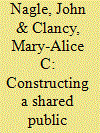

|
|
|
|
|
| Publication |
2012.
|
| Summary/Abstract |
In order to bolster sustainable peace building in violently divided societies, a normative suggestion is that efforts should be made to construct a shared public identity that overarches ethnic divisions. A number of different centripetal/transformationist processes are identified as engineering a shared identity in comparison to consociational arrangements, which are accused of institutionalising ethnic differences and perpetuating conflict. These transformationist approaches essentially rest on the premise that because ethnicity is constructed it can be reconstructed into new, shared forms. Looking at Northern Ireland, we argue that there are limits to the extent that ethnicity can be reconstructed into shared identities. By analysing consociational and centripetalist/transformationist approaches to division, we conclude that although consociationalism will probably not deliver a common identity, it does provide a robust form of conflict regulation.
|
|
|
|
|
|
|
|
|
|
|
|
|
|
|
|
| 6 |
ID:
108498
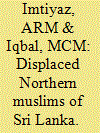

|
|
|
|
|
| Publication |
2011.
|
| Summary/Abstract |
It has been widely established as fact that ethno-political conflict and civil war between the Tamils and the Sinhalese in Sri Lanka have generated immense sufferings among the Tamil and Sinhalese ethnic groups at the level of the masses. However, very little has been discussed about the plights of the Muslims of the North and East, particularly the former who became victims of the Sri Lanka's long running ethnic conflict. In October 1990, the entire Muslim population of Jaffna, Vavumiya, Mullaitivu, Mannar and Kilinochchi districts in the northern region were evicted from their homes at gun point and turned into Internally Displaced Persons overnight by the Tamil Tigers (Liberation Tigers of Tamil Eelam). Muslims of the North claim that they have some basic and important problems to be solved. This study attempts to identify some of the special problems of the expelled Northern Muslims who are languishing in the state supported refugee camps in Puttalam district. A questionnaire on the special problems of the Northern Muslims was circulated to the North Eastern youth, students, unemployed Muslims, and farmers. The population of the target group was selected randomly. More than 250 questionnaires were issued. Ninety percent of them responded to the questionnaire. Interviews were also conducted over the phone with an educated section of the Northern Muslims. Finally, solutions are suggested to the protracted ethno-political conflict based on power-sharing and easing the special problems of the Northern Muslims.
|
|
|
|
|
|
|
|
|
|
|
|
|
|
|
|
| 7 |
ID:
090214
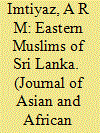

|
|
|
|
|
| Publication |
2009.
|
| Summary/Abstract |
Conflict in Sri Lanka between the Tamils and the Sinhalese brought the Eastern Muslims into the crossfire. Muslim elites and politicians generally cooperate with the Sinhalese ruling class. Such cohabitation irritated the Tamils. Since 1985, relations between the Tamils and the Muslims in the Eastern region have become strained, and Muslims claimed they have some problems to be solved. This study attempts to identify some special problems of the Eastern Muslims. A questionnaire on the special problems of the Eastern Muslims was distributed to the Eastern youth, students, unemployed Muslims and farmers. The population of the target group was selected randomly. More than 150 questionnaires were issued with a 75 percent response rate. Interviews were also conducted on the phone with an educated section of the Eastern Muslims. This study also suggests solutions to the protracted ethno-political conflict based on power sharing.
|
|
|
|
|
|
|
|
|
|
|
|
|
|
|
|
|
|
|
|
|